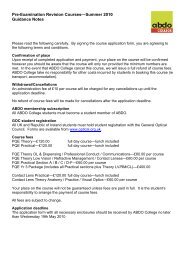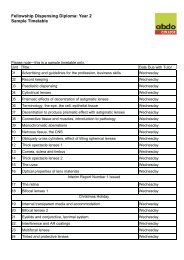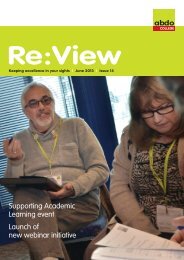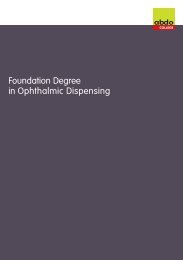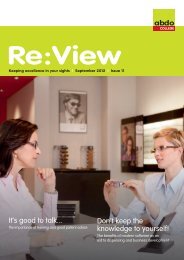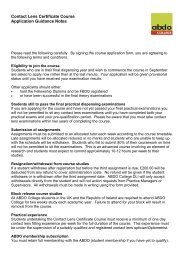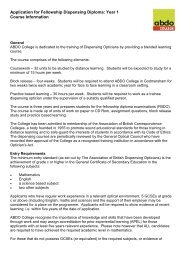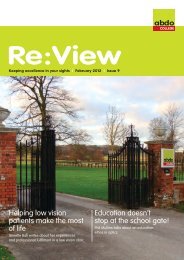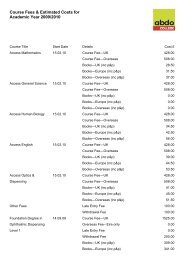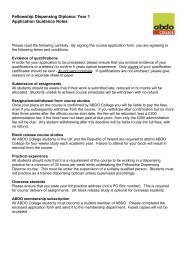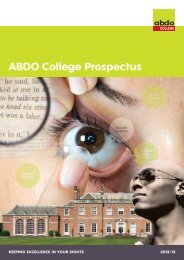ABDO College Prospectus 2013-14.pdf
ABDO College Prospectus 2013-14.pdf
ABDO College Prospectus 2013-14.pdf
Create successful ePaper yourself
Turn your PDF publications into a flip-book with our unique Google optimized e-Paper software.
CoursesAvailable courses range from Access courses for those without GCSEs to advanced andhonours courses allowing qualified professionals to specialise in specific fields of interest.<strong>ABDO</strong> <strong>College</strong> provides courses that lead to the <strong>ABDO</strong> Diploma in Ophthalmic Dispensing(ie the FBDO qualification), awarded by the Association of British Dispensing Opticians. Manyyears of experience combined with a new approach and commitment to quality standards havehelped <strong>ABDO</strong> <strong>College</strong> to be quickly recognised as a centre of excellence for optical education.<strong>ABDO</strong> <strong>College</strong> strives to maintain the highest possible standards and to increase the standingof ophthalmic dispensing in the eyes of the profession, to raise public confidence and increasepublic understanding of the level of training achieved. In addition to this <strong>ABDO</strong> <strong>College</strong> pridesitself in a dedication to maintaining a supportive and caring learning environment for all studentsat all levels.Blended learning education allows students the tremendous benefit of applying contemporaryteaching in a work environment therefore allowing for study that best suits the changingdemands of both student and employer. The student will continue in paid employment forthe duration of their studies thus reducing the need for additional finance and providing theopportunity to establish a credible career development portfolio.A dedication to maintaining a supportiveand caring learning environmentfor ALL STUDENTS at all levels2
HOW DO I APPLY?For an information pack with details of the next intake, fees, deadline and anapplication form contact us by telephone, fax, email, post or via the <strong>ABDO</strong> <strong>College</strong>website www.abdocollege.org.uk.4 Access coursesEnglishGeneral ScienceHuman BiologyMathematicsOptics and Dispensing6 Ophthalmic Dispensing coursesFoundation Degree in Ophthalmic DispensingBSc (Hons) in Ophthalmic DispensingFellowship Dispensing DiplomaRevision Courses13 Contact Lens coursesContact Lens CertificateGetting StartedContact Lens HonoursRevision Courses21 Low Vision coursesLV TasterLow Vision HonoursRevision Course26 Revision coursesDistance learning revision coursesRevision courses held at Godmersham29 Optical Dispensing Studies courseBSc (Hons) in Optical Dispensing Studies32 <strong>ABDO</strong> <strong>College</strong> Student Accommodation<strong>ABDO</strong> <strong>College</strong> BookshopIf you require any further assistance please call thecourses team at <strong>ABDO</strong> <strong>College</strong>01227 733 9013
Access CoursesAccess Courses available from <strong>ABDO</strong> <strong>College</strong> are designed to help prospective dispensingoptician students to meet the necessary entry requirements. They are also a useful refresherfor those who have been out of education for some time.The entry requirements for the <strong>ABDO</strong> Level 6 Diploma in Ophthalmic Dispensing (FBDO) and theCanterbury Christ Church University Foundation Degree / BSc (Hons) in Ophthalmic Dispensing arefive GCSEs at grade c or above, which must include English, maths and a science. Each passedaccess course is accepted in place of one GCSE.The access courses are available in the key subjects of English, General Science, Human Biology,Mathematics, Optics and Dispensing.Access Optics and Dispensing presents introductory level information to facilitate an initialunderstanding of these important disciplines. It is also therefore a particularly useful course fornew staff induction and for practice reception staff.Access courses run once a year starting in February and each course takes approximately20 weeks. The timing is designed to align with entry to dispensing courses each September.Access Courses are currently assessed by continuous assessment only and students arerequired to achieve an average mark of 70 per cent in their coursework assignments in orderto pass.ASSESSMENTAll Access courses are currently based on continuous assessment.A minimum of 80 per cent of the coursework must be submittedin order for the course to be considered completed. The pass markis an average assignment mark of 70 per cent.4
HOW DO I APPLY?For an information pack with details of the next intake, fees, deadline and anapplication form contact us by telephone, fax, email, post or via the <strong>ABDO</strong> <strong>College</strong>website www.abdocollege.org.uk.ENGLISHSubjectsWords; Sentences; Punctuation;Review; Verbs (present tense);Verbs (past and future tense);Comprehension; Adjectives; Adverbs;Paragraphs; Note taking; Spelling;Reports; Letters; Essay wriiting;Essay planning; Curriculum VitaeDuration 20 weeksRecommended readingMature Students Guide to Writing –Jean RoseThe Sciences Good Study Guide –A Northedge, J Thomas, A Laneand A PeasgoodGENERAL SCIENCESubjectsLiving things; Support and movement;Senses and responses; Our effecton the environment; Raw materials,elements and compounds; Theenvironment – air and water;Particles; Metals and alloys; Acids,bases and salts; The chemicalindustry; Energy and fuels; Motion;Force; Energy transfers; Energy andwaves; Light and colourDuration 18 weeksHUMAN BIOLOGYSubjectsThe Human Body; Circulation;The respiratory system; Food anddigestion; The urinary system;The nervous system; The endocrinesystem; The skeletal system;Muscles; Resistence and immunityDuration 17 weeksRecommended readingAnatomy & Physiology in Health& Illness (11th edition) – A Waugh /A GrantMATHEMATICSSubjectsBasic Arithmetic; Fractions; Ratioand Proportion; Decimals; Use ofCalculators; Percentages; Graphs fromData; Basic Algebra; Expansion ofbrackets and Factorisation; AlgebraicFractions; Solution of Simple Equations;Formulae; Quadratic Equations;Simultaneous Equations; Graphs ofFunctions; Indices; Angles; Triangles;Trigonometry; Further trigonometry;VectorsDuration 21 weeksEssential readingCountdown to Mathematics (Vol 1) –Lynne Graham and David SargentRecommended readingCountdown to Mathematics (Vol 2) –L Graham / D SargentOPTICSAND DISPENSINGSubjectsIntroduction to the eye;How the eye works; Maths revision;Electromagnetic spectrum, refractiveindex and refraction of light; Sphericallenses; Optical correction of refractiveerrors; Lens measure and lens thickness;Prescriptions and their transposition;Prisms; Bifocal and Multifocal Lenses;Lens materials and their properties;Lens tints and coatings; Facial andframe measurements; Frame selectionand adjustment; Reflection of lightDuration 16 weeksEssential readingPractical Dispensing (3rd edition) –A I GriffithsRecommended readingOptics (2nd edition) –A H Tunnacliffe /J G HirstHOW DO I GET MY BOOKS?<strong>ABDO</strong> <strong>College</strong> have their own bookshop and sell all of the books that youwill need for your course. Contact Justin Hall at the <strong>ABDO</strong> <strong>College</strong> Bookshopby telephone on 01227 733 904, by email at jhall@abdocollege.org.ukor order online at www.abdocollege.org.uk.5
Ophthalmic Dispensing Courses<strong>ABDO</strong> <strong>College</strong> offers two routes to become a dispensing optician:• Canterbury Christ Church University Degree• Fellowship Dispensing DiplomaThese are both ‘blended learning courses’, they are both delivered by <strong>ABDO</strong> <strong>College</strong>and they both lead to registration with the General Optical Council as a dispensing optician.What is a dispensing optician?The profession of ophthalmic dispensingis over 250 years old. As in the past, thesupply of spectacles and other visualaids is important to a modern society.Of prime concern to every qualifieddispensing optician (DO) is the visualcomfort of the patient.A prescription issued by an ophthalmicmedical practitioner or optometristfollowing an eye examination statesthe measure of the degree of error inthe patient’s sight; the DO’s skill andexpertise lies in the interpretation of thisprescription. From the prescription theDO is able to supply an accurate aidto the patient's vision; either spectaclesor other appropriate appliances.The work of the dispensing opticianinvolves prescription analysis, adviceon lens type and styling of frames,and taking frame, facial and lensesmeasurements. Before any finishedspectacles are deemed acceptablefor a patient, they must be checked toensure they correspond to the prescriptionand final ordered specifications, andare suitable for the conditions in whichthey will be used. After the patient hasreceived the new spectacles and hasbeen instructed in how to get the bestresults from them, the DO is alwaysavailable to offer advice and effectadjustments and repairs if necessary.The supply and fitting of contact lensesinvolves different processes to fittingspectacles, and after completion of thestandard course, advanced coursesare run for those wishing to specialisein the subject.Registration with the General OpticalCouncil as a dispensing optician isobtained after qualifying for <strong>ABDO</strong> Level6 Diploma in Ophthalmic Dispensing(enabling the use of ‘FBDO’ after theDO’s name).Dispensing optics offers immense jobsatisfaction to people who are interestedin combining a profession in healthand social care with a mathematical/scientific knowledge base and enjoyinteracting directlywith the public.6
BLOCKRELEASEBLENDEDLEARNINGPRACTICE-BASEDLEARNINGDISTANCELEARNINGTo become a dispensing optician you will also need to complete aPre-Qualification Portfolio (PQP). This portfolio is made up of a set numberof case records that you build up over a three-year period and makesup a part of your final examinations. This will all be explained whenyou attend for your first block release and we will issue the PQP toall students.What is blended learning?The dispensing courses are deliveredby a method called ‘blended learning’that consists of practice-based learning,block release and distance learningcoursework.How does distance learningstudy work?We will send you some courseworkmaterial to work through and someassignment questions to answer foreach part of the course. We will alsoallocate you a personal tutor and sendyou their contact details and a timetablefor you to work to. There are 32 units ofcoursework and you will work throughone each week. You then send yourwork to your personal tutor who willmark it for you and return it to you withsome feedback. You can expect thiscoursework to take you between 10and 15 hours per week and you willneed to be disciplined to make sureyou keep up.For the degree courses there is alsolearning material and assessment byelectronic means. A ’virtual learningenvironment’ provides additionalresources, peer support and digitaldrop box for your complete assessmentwork. This work will be guided by themodule leader.What is block release?Block release is a two week periodof intensive study that will support youwith your theory and practical studiesand give you the chance to meet someof your fellow students. There will betwo of these block release periods ineach year. Block release is held at<strong>ABDO</strong> <strong>College</strong> in Godmersham, Kentand it is a compulsory part of the coursefor all students from the UK and ROI.What is practice-based learning?While you are studying for yourFBDO you will be training full-time.This training consists not just of yourblock release and distance learningcoursework but also of your learningin practice with your supervisor. Youand your supervisor will be issuedwith a Practical Training Timetable toguide you both through this part ofyour training.You will also need to complete aPre-Qualification Portfolio (PQP). Thisportfolio is made up of a set numberof case records that you build up overa three-year period and makes up apart of your final examinations. Thiswill all be explained when you attendfor your first block release and wewill issue the PQP to all students.7
<strong>ABDO</strong> COLLEGE | OPHTHALMIC DISPENSING COURSESFoundation Degree/BSc (Hons) in Ophthalmic DispensingHow long is the degree course?The programme is made up of two partsand takes three years in all. The firsttwo years form the Foundation Degreein Ophthalmic Dispensing. In the thirdyear you have a choice of completinga BSc (Hons) in Ophthalmic Dispensingand the FBDO or just the FBDO. We willdiscuss the options open to you and helpyou to choose a suitable course whenthe time comes. In both cases you willcomplete the examinations set by theAssociation of British Dispensing Opticiansin order to qualify as a dispensingoptician. Your initial application will befor the two year Foundation Degree.What will I learn on this course?There are six, twenty credit, modulesin each of the first two years. They areall compulsory.In the first year the modules are:Preparation for Learning,Ophthalmic Lenses 1,Optics 1,Ophthalmic Lenses 2,Optics 2 andCommunication in the Workplace.In the second year the modules are:Ophthalmic Dispensing, AdvancedOphthalmic Lenses, Evidence BasedPractice, Professional Conduct, OphthalmicAnatomy and Individual Project.The third year will depend on whichoption you choose; however, both courseswill include Refractive Management,Low Vision and Contact Lenses.The Foundation Degree and BSc (Hons)courses are based around the <strong>ABDO</strong>Syllabus and the GOC Core Curriculumfor Dispensing Opticians. Both of thesedocuments are available on requestfrom the appropriate body.Who is running the course?<strong>ABDO</strong> <strong>College</strong> and Canterbury ChristChurch University (CCCU) are runningthe Foundation Degree and BSc (Hons)courses together as partners. You wouldbe a student with both.Who is it aimed at?The degree course route is for traineedispensing opticians working in practicein the UK or Ireland who are interestedin advancing their optical knowledgeand gaining an internationallyrecognised qualification.Do I have to be workingin practice?Yes. It is essential that you areworking in practice and involved ina comprehensive variety of tasks inorder to gain the necessary practicalexperience. You need a supervisorand the support of your employer.Are there any special requirements?Yes. You will need to have regularaccess to a computer and the internet.Some of your study material will beprovided on a ‘virtual learningenvironment’ called CLIC Learn.What qualifications do I needto start the Foundation Degree?You will need to have five GCSEs ofgrade c or above in English, mathematics,science and two other subjects. You needto have evidence of recent study (withinthe last five years) and/or experience inpractice of five years or more.What should I do if I don'thave these qualifications?Call us and we can talk through youroptions with you; you may need to takeAccess Courses first.Do I have to be a memberof <strong>ABDO</strong>?Yes, you will need to retain studentmembership for the duration of yourcourse.Do I have to register withthe General Optical Council?Yes. Student registration will cost £20*per year (with a cheque made payableto ‘The General Optical Council’).*Correct at time of going to print.Are there any other coursesin dispensing?Yes. <strong>ABDO</strong> <strong>College</strong> also run aFellowship Dispensing Diploma courseby blended learning. This course takesthree years and also prepares studentsfor <strong>ABDO</strong> examinations to become adispensing optician. The difference isthat the diploma course is not accreditedby a university and will not give you arecognised academic qualification.Will I be a dispensing optician atthe end of the degree programme?Yes. If you want to become a dispensingoptician, and we hope that you do, youwill have to study for three years andtake external (<strong>ABDO</strong>) examinations.Success in these examinations will allowyou to register with the General OpticalCouncil as a dispensing optician.What books will I need forthis course?Foundation Degree Year 18
HOW DO I APPLY?For an information pack with details of the next intake, fees, deadline and anapplication form contact us by telephone, fax, email, post or via the <strong>ABDO</strong> <strong>College</strong>website www.abdocollege.org.uk.Essential readingCite Them Right – R Pears & G ShieldsThe Study Skills Handbook(3rd edition) – S CottrellFoundations in Nursing and Health Care:Beginning reflective practice – M JasperOptics (2nd edition) –A H Tunnacliffe /J G HirstPractical Ophthalmic Lenses(3rd edition) – M Jalie / L WrayEssentials of Dispensing(2nd edition) – A H TunnacliffeWorked Problems in Optics(2nd edition) – A H TunnacliffeWorked Problems in Ophthalmic Lenses(3rd edition) – A H Tunnacliffe /J G HirstPrinciples of Ophthalmic Lenses(4th edition) – M JaliePractical Dispensing (3rd edition) –A I GriffithsFrame Rule with Instruction Manual(<strong>ABDO</strong>)British Standards Extracts (BSI/<strong>ABDO</strong>)Recommended ReadingA Handbook of Reflective andExperiential Learning – J MoonCritical Thinking: An exploration oftheory and practice – J MoonHow to Find Information – S RumseyHow to Read a Paper: The basics ofevidence based medicine – T GreenhalghSkills for Success: The personaldevelopment planning handbook –S CottrellThe Handbook ofCommunication Skills – O HargieSkilled Interpersonal Communication:Research – theory and practice(4th edition) – O Hargie & D DicksonSkills for Communicating with Patients –Siverman, Kurtz & DraperCommunication Skills for the HealthCare Professional – G Van ServellenFacial Measurement Gauge –Paul Fairbanks FSMCDictionary of Optometry and VisualScience (7th edition) – M MillodotReading lists for the Foundation DegreeYear 2, BSc (Hons) Year 3 and additionalbackground reading are available fromthe <strong>ABDO</strong> <strong>College</strong> Bookshop.What should I do if I amnot sure whether this is theright course for me?Call us. We are happy to answerquestions about the available coursesfrom <strong>ABDO</strong> <strong>College</strong> and to provide youwith all the information you need tomake an informed decision.Who should I call if I havequestions or need help fillingin the forms?Call the courses team at <strong>ABDO</strong> <strong>College</strong>on 01227 733 911. Any member of theteam will be happy to help you.What should I do if I aminterested in applying forthe degree?Talk to your employer straight away.There are a limited number of spaceson the degree course and when itis full, it is full! Your employer willneed to provide you with a dedicatedsupervisor to work with you andhelp you with your training in practice.If your employer or supervisor hasany questions they should call us.CANTERBURY CHRIST CHURCH UNIVERSITY:AN INSPIRING AND WELCOMING COMMUNITYCanterbury Christ Church University is renowned for academic excellence, awarm welcoming atmosphere and community spirit. It is a modern university,immersed in culture, and with a strong reputation for delivering high qualityprofessional public service education.The University’s success has led to the growth of campuses across Kent, anddevelopment of programmes and research impacting on regional, nationaland international health and social care services.Each year over 20,000 students are welcomed into the University’s supportiveand friendly learning environment to carry out undergraduate and postgraduatestudy, and research.The main Canterbury Campus is based in a World Heritage Site and in Englandand Wales’ second safest university city.Canterbury Christ Church University is committed to promoting equality ofopportunity and diversity and widening participation. The University ensuresthat all its members are valued for their qualities,skills, experience, abilities and contribution to theorganisation in their learning.9
<strong>ABDO</strong> COLLEGE | OPHTHALMIC DISPENSING COURSESFellowship Dispensing DiplomaHow long is the diploma course?The course is three years and preparesstudents for the fellowship diplomaexaminations (FBDO). The course ismade up of units of work on paper,assignment questions, block releasestudy and practice-based learning.What will I learn on this course?The Fellowship Dispensing Diplomacourse is based around the <strong>ABDO</strong>Syllabus and the GOC Core Curriculumfor Dispensing Opticians. Both of thesedocuments are available on requestfrom the appropriate body.Year 1Theory:Ophthalmic Lenses,Optics,Professional Conductand Communication Skills.Practical:Ophthalmic Dispensing PracticeYear 2Theory:Ophthalmic Dispensing,Advanced Ophthalmic Lenses,Ophthalmic Anatomy,Professional Conductand Communication Skills.Year 3Theory:Refractive Management,Low Vision and Contact Lenses.Practical:Advanced OphthalmicDispensing Practice.Who is running the course?<strong>ABDO</strong> <strong>College</strong>.Who is it aimed at?The diploma course is for traineedispensing opticians working in opticalpractice in the UK, Ireland or overseaswho are interested in advancing theiroptical knowledge but do not want toachieve a university degree.Do I have to be workingin practice?Yes. It is essential that you areworking in practice and involved ina comprehensive variety of tasks inorder to gain the necessary practicalexperience. You need a supervisorand the support of your employer.Are there any specialrequirements?No.What qualifications do I needto start the Fellowship DispensingDiploma course?You will need to have five GCSEs ofgrade c or above in English, mathematics,science and two other subjects.You need to have evidence of recentstudy (within the last five years) and/orexperience in practice of five yearsor more.What should I do if I don'thave these qualifications?Call us and we can talk through youroptions with you. Perhaps you will needto take Access Courses first?Do I have to be a memberof <strong>ABDO</strong>?Yes, you will need to retain studentmembership for the duration of yourcourse.Do I have to register withthe General Optical Council?Yes. Student registration will cost £20*per year (with a cheque made payableto ‘The General Optical Council’).*Correct at time of going to print.Are there any other coursesin dispensing?Yes. <strong>ABDO</strong> <strong>College</strong> also run a FoundationDegree and BSc (Hons) course byblended learning. This course takesthree years and also prepares studentsfor <strong>ABDO</strong> examinations to become adispensing optician. The difference isthat the degree course is accreditedby a university and will give you arecognised academic qualification.Will I be a dispensing optician atthe end of the diploma programme?Yes. If you want to become a dispensingoptician, and we hope that you do, youwill have to study for three years andtake external (<strong>ABDO</strong>) examinations.Success in these examinations will allowyou to register with the General OpticalCouncil as a dispensing optician.10
HOW DO I APPLY?For an information pack with details of the next intake, fees, deadline and anapplication form contact us by telephone, fax, email, post or via the <strong>ABDO</strong> <strong>College</strong>website www.abdocollege.org.uk.What books will I need forthis course?Essential readingOptics (2nd edition) –A H Tunnacliffe / J G HirstEssentials of Dispensing(2nd edition) – A H TunnacliffeWorked Problems in Optics(2nd edition) – A H TunnacliffeWorked Problems in Ophthalmic Lenses(3rd edition) –A H Tunnacliffe / G D JanneyPrinciples of Ophthalmic Lenses(4th edition) – M JaliePractical Dispensing (3rd edition) –A I GriffithsFrame Rule with Instruction Manual(<strong>ABDO</strong>)British Standards Extracts (BSI/<strong>ABDO</strong>)Recommended readingPractical Ophthalmic Lenses(3rd edition) – M Jalie / L WrayDictionary of Optometry & Visual Science(7th edition) – M MillodotThe Sciences Good Study Guide –A Northedge, J Thomas, A Laneand A PeasgoodHow do I get my books?<strong>ABDO</strong> <strong>College</strong> have their ownbookshop and sell all of the booksthat you will need for your course.Contact Justin Hall at the <strong>ABDO</strong><strong>College</strong> Bookshop by telephoneon 01227 733 904, by email atjhall@abdocollege.org.uk or orderonline at www.abdocollege.org.uk.What should I do if I am notsure whether this is the rightcourse for me?Call us. We are happy to answerquestions about the available coursesfrom <strong>ABDO</strong> <strong>College</strong> and to provide youwith all the information you need tomake an informed decision.Who should I call if I havequestions or need help fillingin the forms?Call the courses team at <strong>ABDO</strong> <strong>College</strong>on 01227 733 921. Any member of theteam will be happy to help you.What should I do if I am interestedin applying for the diploma?Talk to your employer straight away.There are a limited number of spaceson the course and when it is full, it isfull! Your employer will need to supportyou and you will need a dedicatedsupervisor to work with you and helpyou with your training in practice.If your employer or supervisor hasany questions they should call us.11
ROUTE FOR A DISPENSING OPTICIAN TO BECOME A CONTACT LENS OPTICIANFBDOContact Lens Certificate CourseTheory RevisionTheory ExaminationsGetting StartedPractical RevisionPractical ExaminationsCLO12
Contact Lens CoursesWHAT IS A CONTACT LENS OPTICIAN?A contact lens optician (CLO) is a specialist practitioner who is trained and qualified tofit, and provide aftercare for, patients with contact lenses. Contact lens opticians assesswhether contact lenses meet the needs of their patient, resolving clinical and tolerance issues,and remain responsible for clinical decisions enabling them to provide continuity of care totheir patients.The contact lens specialty is open to dispensing opticians (as well as optometrists andophthalmologists) and involves extra study and clinical practice. Once the specialist trainingis completed and competence assessed, practitioners must register their specialty with theGeneral Optical Council. They are then able to perform additional duties to those of adispensing optician.WHAT COURSES ARE AVAILABLE?14 Contact Lens Certificate17 Getting Started18 Contact Lens Honours26 Contact Lens Theory Revision (Distance Learning) – See Revision Courses26 Theory and Practical Revision (held at Godmersham) – See Revision Courses13
<strong>ABDO</strong> COLLEGE |CONTACT LENS COURSESContact Lens CertificateWhat will I learn on this course?The Contact Lens Certificate course isbased around the <strong>ABDO</strong> Syllabus andthe GOC Contact Lens Core Competencies.Both of these documents are availableon request from the appropriate body.The three key areas of theorystudy are:1. Ocular Anatomy, Physiologyand Related Pathology; eyelids,pre-corneal tear film, lacrimal system,cornea, sclera, conjunctiva andanterior chamber.2. Visual Optics; instrumentationand emerging technology, refractivetechniques, the optics of the eye andthe optics of contact lenses.3. Contact Lens Practice; instrumentation,clinical procedures, abnormal conditions,design, materials, manufacture andrelated terminology, clinical applicationof all contact lens types, solutionsand drugs.The practical elements are; initialassessment, soft contact lens fitting,RGP contact lens fitting, complex lenses,aftercare routine and management,verification and identification.How long is this course?The theory course takes one academicyear. Beyond this there is a requirementto develop patient case records andmany students take an additional sixmonths – one year before undertakingthe practical examinations.What level is this course?The <strong>ABDO</strong> Contact Lens Certificate isan ‘advanced level’ qualification thathas been accredited by Ofqal (Officeof Qualifications and ExaminationsRegulation) as level 6 on the NationalQualifications Framework (NQF). Thismeans that it is the same academiclevel as a Bachelors degree withhonours.What is blended learning?This Contact Lens Certificate course isdelivered by a method called ‘blendedlearning’ that consists of practice basedlearning, block release and distancelearning coursework.How does distance learningstudy work?We will send you some courseworkmaterial to work through and someassignment questions to answer foreach part of the course. We will alsoallocate you a personal tutor andsend you their contact details and atimetable for you to work to. There are32 units of coursework and you willwork through one each week. As thecourse is at advanced level, you willBLENDEDLEARNINGBLOCKRELEASEPRACTICE-BASEDLEARNINGDISTANCELEARNING14
also need to undertake some additionalresearch and read around the subjectin order to gain a thorough understandingof the subject. You then send your workto your personal tutor who will mark itfor you and return it to you with somefeedback. You can expect thiscoursework to take you approximately15 hours per week and you will needto be disciplined to make sure youkeep up.What is block release?Block release is a one week period ofintensive study that will support you withyour theory and practical studies andgive you the chance to meet some ofyour fellow students. There will be twoof these block release periods in theyear. Block release is held at <strong>ABDO</strong><strong>College</strong> in Godmersham, Kent and it isa compulsory part of the course for allstudents.What is practice-based learning?While you are studying your ContactLens Certificate you will be training incontact lens practice. This trainingconsists not just of your block releaseand distance learning coursework butalso of your learning in practice withyour supervisor.You and your supervisor will be issuedwith a workbook to guide you boththrough this part of your training. Youwill learn practical skills from yoursupervisor and work with patients inpractice (under supervision) to perfectthese skills.To become a contact lens optician youwill also need to complete a set numberof case records that you build up overa one-year period and makes up a partof your final examinations.Who is running this course?<strong>ABDO</strong> <strong>College</strong>.Who is this course for?The Contact Lens Certificate courseis for qualified dispensing opticians,optometrists or ophthalmologists thathave a specialist interest in workingwith patients in a clinical environmentto provide a wide range of availableservices.Do I have to be workingin practice?Yes, you must be working in practiceas a trainee contact lens optician fora minimum of one day a week. It isessential that you are gaining practicalexperience to support your theorylearning and developing practical skillsin contact lens practice.What qualifications do I needto start the Contact Lens Certificatecourse?You must hold the <strong>ABDO</strong> Level 6 Diplomain Ophthalmic Dispensing (FBDO) or bea qualified optometrist.What should I do if I don’t havethese qualifications?If you are unsure about your eligibilityto undertake the CL Certificate courseplease call us and we will be happyto discuss your options with you.Do I have to be a memberof <strong>ABDO</strong>?Yes, you will need to retain fullmembership for the duration ofyour course.Do I have to register withthe General Optical Council?Yes, as a practicing dispensing opticianor optometrist, it is essential that youretain full registration for the durationof your course.What qualification will I achieveat the end of the Contact LensCertificate programme?The Contact Lens Certificate courserun by <strong>ABDO</strong> <strong>College</strong> preparesstudents for the Contact Lens Certificateexaminations available from theAssociation of British DispensingOpticians.15
<strong>ABDO</strong> COLLEGE | CONTACT LENS COURSESWhat books will I need forthis course?Essential readingAbnormal Ocular Conditions(2nd Edition) – D M Pipe / L J RapleyOcular Anatomy & Histology(3rd Edition) – D M Pipe / L J RapleyManual of Monocular SubjectiveRefraction – H FreemanContact Lens Complications –(2nd Edition) – N EfronContact Lens Manual (4th edition) –Gasson / MorrisContact Lenses (5th Edition) –Phillips and SpeedwellOphthalmology In Focus –Jack J Kanski & Brad BowlingClinical Anatomy and Physiologyof the Visual System (3rd edition) –Lee Ann RemingtonRecommended readingBritish National Formulary –British Medical AssociationContact Lenses A–Z – EfronDictionary of Optometry & VisualScience (7th edition) – M MillodotVisual Optics Primer & Revisionon CD ROM – TunnacliffeGeometrical Optics Lectures onCD ROM – TunnacliffeCornea Atlas (2nd Edition) –J. Krachmer MD and D. Palay MDContact Lens Practice (2nd edition) –Nathan EfronHow do I get my books?<strong>ABDO</strong> <strong>College</strong> have their own bookshopand sell all of the books that you willneed for your course. Contact Justin Hallat the <strong>ABDO</strong> <strong>College</strong> Bookshop bytelephone on 01227 733 904, by emailat jhall@abdocollege.org.uk or orderonline at www.abdocollege.org.uk.What should I do if I am not surewhether this is the right coursefor me?Call us. We are happy to answerquestions about the available coursesfrom <strong>ABDO</strong> <strong>College</strong> and to provide youwith all the information you need tomake an informed decision.We may also be able to put youin touch with other members who havepreviously completed this course.Who should I call if I havequestions or need help fillingin the forms?Call the courses team at <strong>ABDO</strong> <strong>College</strong>on 01227 733 920. Any member of theteam will be happy to help you.What should I do if I am interestedin applying for the Contact LensCertificate course?Talk to your employer straight away.Your employer will need to support youand you will need a dedicated supervisorto work with you and help you with yourtraining in practice. If your employer orsupervisor has any questions theyshould call us.16
HOW DO I APPLY?For an information pack with details of the next intake, fees, deadline and anapplication form contact us by telephone, fax, email, post or via the <strong>ABDO</strong> <strong>College</strong>website www.abdocollege.org.uk.Getting StartedWho is this course for?Getting Started is for students who havecompleted the Contact Lens CertificateCourse with <strong>ABDO</strong> <strong>College</strong>, taken theirtheory exams and are ready to startworking towards practical exams nextyear. It is to help you know where to getstarted, what to do next and to adviseyou of the legal and examinationrequirements.What will I learn on this course?The Getting Started course has beendesigned to guide and support studentsin preparation for contact lens certificatepractical examinations.The programme will include:1. Revision LecturesInstrumentationRGP & soft lens fittingAftercare consultationsManagement of commonaftercare issues2. Practical Hands-On SessionsSlit-lamp examinationsRGP fittingSoft lens fittingOver-refraction3. Tutorial SessionsThe legal implicationsHow to plan the time until the examCase record preparationThe practical examinationPlease noteGetting Started is not a pre-examinationrevision course for those sitting practicalexaminations this year – it is a preparationcourse for students planning to sit theirpractical exams at the summer or wintersessions next year. For revision coursesplease see pages 26 to 28.How long is this course?Getting Started is a two day course heldat Godmersham.Who is running this course?<strong>ABDO</strong> <strong>College</strong>.Do I have to be working in practice?Although not an essential courserequirement, it is preferable that youare gaining practical experience (undersupervision) to support your learningand developing practical skills in contactlens practice.What qualifications do Ineed to attend the GettingStarted course?Applicants will normally have satthe <strong>ABDO</strong> contact lens certificatetheory examinations.What should I do if I don’thave these qualifications?If you are unsure about yoursuitability to attend Getting Startedplease call us and we will be happyto discuss your options with you.Do I have to be a memberof <strong>ABDO</strong>?Yes, you will need to retain fullmembership for the duration ofyour course.Do I have to register with theGeneral Optical Council?Yes, it is essential that you retain fullregistration as a practicing dispensingoptician for the duration of your course.What should I do if I am notsure whether this is the right coursefor me?Call us. We are happy to answerquestions about the available coursesfrom <strong>ABDO</strong> <strong>College</strong> and to provide youwith all the information you need tomake an informed decision.Who should I call if I havequestions or need help fillingin the forms?Call the courses team at <strong>ABDO</strong> <strong>College</strong>on 01227 733 921. Any member of theteam will be happy to help you.How do I apply?For an information pack with detailsof the next intake, fees, deadlineand an application form pleasecontact us by telephone, fax, email,post or via the <strong>ABDO</strong> <strong>College</strong>website (www.abdocollege.org.uk).17
<strong>ABDO</strong> COLLEGE |CONTACT LENS COURSESContact Lens HonoursWhat will I learn on this course?The Contact Lens Honours course hasbeen designed to guide and supportthose interested in attaining a highercontact lens qualification and to preparestudents for the <strong>ABDO</strong> ‘AdvancedDiploma in Contact Lens Practice’examinations. Students are expectedto develop current knowledge, skillsand experience in the specialist fieldof contact lens practice at a moreadvanced level than the Contact LensCertificate. Examination candidates willbe assessed on their practical abilityand knowledge of modern contact lenspractice including fitting complex lensesand advanced contact lens aftercare.The five key areas of study are:A.Toric Lens FittingB. Presbyopia CorrectionC.Remedial FittingsD.Current KnowledgeE. Case RecordsHow long is this course?The course contains a block programme(two days at Godmersham) which willinclude both lecture and practicalsessions, astigmatic and presbyopiccorrection, remedial fittings,over-refraction techniques and caserecord formats. It will also addressthe various forms of assessment withinthe <strong>ABDO</strong> examination.Revision of the theoretical element of thevarious subject areas will be supportedby the distance learning programme.Students will be expected to completefour assignments on a monthly basis.Lastly, a pre-examination day willinvolve a mixture of formats designed toassess theory and practical knowledgein preparation for the examination.What level is this course?The <strong>ABDO</strong> Diploma in AdvancedContact Lens Practice is an ‘honourslevel’ qualification that has beenaccredited by Ofqal (Office ofQualifications and ExaminationsRegulation) as level 7 on the NationalQualifications Framework (NQF).This means that it is at the sameacademic level as a Mastersdegree or postgraduate certificate(ie M level credits).How does distance learningstudy work?When you attend for your blockprogramme we will give you somecoursework material to work throughand some assignment questions toanswer. We will also allocate you apersonal tutor and give you their contactdetails and a timetable for you to workto. There are four units of courseworkand you will work through one eachmonth. You then send your work to yourpersonal tutor who will mark it for youand return it to you with some feedback.As the course is at honours level, youwill need to undertake some additionalresearch and read around the subject inorder to gain a thorough understandingof the subject. You will need to bedisciplined to make sure you keep up!Who is running this course?<strong>ABDO</strong> <strong>College</strong>.Who is this course for?The Contact Lens Honours course is forqualified contact lens opticians who areinterested in developing their knowledgeand skills to a more advanced level toachieve the Advanced Contact LensDiploma of the Association.Do I have to be working in practice?Although not an essential courserequirement, it is preferable that you aregaining practical experience to supportyour learning and developing advancedpractical skills in contact lens practice.What qualifications do I needto start the Contact LensCertificate course?You must hold the <strong>ABDO</strong> Certificatein Contact Lens Practice (FBDO CL).You must also provide evidence ofa minimum period of 12 monthsexperience in contact lens practicefollowing achievement of theCertificate in Contact Lens Practiceand be on the GOC Contact LensSpeciality Register.What should I do if I don’t havethese qualifications?If you are unsure about your eligibilityto undertake the Contact Lens Honourscourse please call us and we will behappy to discuss your options with you.18
HOW DO I APPLY?For an information pack with details of the next intake, fees, deadline and anapplication form contact us by telephone, fax, email, post or via the <strong>ABDO</strong> <strong>College</strong>website www.abdocollege.org.uk.Do I have to be a memberof <strong>ABDO</strong>?Yes, you will need to retain fullmembership for the duration ofyour course.Do I have to register with theGeneral Optical Council?Yes, as a practicing dispensing optician,it is essential that you retain registrationwith contact lens speciality for theduration of your course.What qualification will I achieveat the end of the Contact LensHonours course?The Contact Lens Honours course runby <strong>ABDO</strong> <strong>College</strong> prepares students forthe Diploma in Advanced Contact LensPractice examinations available fromthe Association of British DispensingOpticians which leads to the FBDO(Hons) CL qualification.What should I do if I am notsure whether this is the rightcourse for me?Call us. We are happy to answerquestions about the available coursesfrom <strong>ABDO</strong> <strong>College</strong> and to provide youwith all the information you need tomake an informed decision. We mayalso be able to put you in touch withother members who have previouslycompleted this course.Who should I call if I havequestions or need help fillingin the forms?Call the courses team at <strong>ABDO</strong> <strong>College</strong>on 01227 733 901. Any member of theteam will be happy to help you.llPlease note this course is onlyrun periodically.19
‘A person with low vision is one who hasimpairment of visual functioningeven after treatment and/or standard refractive correction and has a visualacuity of less than 6/18 to light perception, or a visual field of less than 10°from the point of fixation, but who uses, or is potentially able to use, visionfor the planning and/or execution of a task.’According to the World Health Organisation (1993)20
Low Vision CoursesWHAT IS LOW VISION?There are two categories of registration for people with visual impairment; sight impaired(partially sighted) and severely sight impaired (blind). The categorisation is dependant upona combination of the patient’s visual acuity and available visual field and does not necessarilymean that they are unable to see anything.Visual impairment can affect children, adults and elderly people and can be caused bycongenital conditions, injury or illness. Eye conditions leading to visual impairment includecataract, glaucoma, diabetic retinopathy, macular degeneration and retinitis pigmentosa.Management of the related conditions and support for people with visual impairment mayinvolve a multi-disciplinary team including ophthalmologists, optometrists and dispensingopticians as well as GPs, rehabilitation workers, social workers, teachers and charitynetwork facilitators.WHY SPECIALISE IN THE FIELD OF LOW VISION?People with visual impairment, and their relatives, need to understand more about their eyecondition and the difficulties that people with low vision experience on a daily basis. The WorldHealth Organisation estimates that there are approximately 124 million people in the world withlow vision of whom about a quarter would benefit from low vision services. Eye care practitionersmust provide a quality service sensitive to the individual needs of those who are sight impaired,helping them to attain the highest level of independence.This is an interesting field of clinical practice spanning ocular pathology, epidemiology, lighting,optical design, psychological adaptation and devices for sensory substitution.WHAT COURSES ARE AVAILABLE?22 Low Vision Taster23 Low Vision Honours26 Theory Revision (Paper One) Optics – See Revision Courses21
<strong>ABDO</strong> COLLEGE | LOW VISION COURSESHOW DO I APPLY?For an information pack with details of the next intake, fees, deadline and anapplication form contact us by telephone, fax, email, post or via the <strong>ABDO</strong> <strong>College</strong>website www.abdocollege.org.uk.Low Vision TasterWhat will I learn on this course?The Low Vision Taster course is aone-day course held at <strong>ABDO</strong> <strong>College</strong>,Godmersham, Kent. This interestingmixture of lectures and workshops havebeen put together to provide a usefulinsight into the satisfying field of lowvision work. This full day of sessionswill provide a beginners guide to variouselements of managing low vision.A typical timetable would be:Categories & StrategiesSighted Guide WorkshopMagnification & AssessmentThe Rehabilitation ProcessLVA in the High StreetMy Perspective – one person’sinsight into adapting to low vision.Who is running this course?<strong>ABDO</strong> <strong>College</strong>.Who is this course for?This course appeals to anyone witha general interest in low vision, anyoneconsidering the honours course andthose requiring CET points. There area limited number of spaces and it runsjust once a year.22
Low Vision HonoursWhat will I learn on this course?Objective and subjective refraction,low vision assessment and registrationprocedures, magnification, availabilityand use of magnifiers, psychologicalimpact of visual loss, appliances andtraining for the patient with low vision,contrast sensitivity, illumination & filters,ocular pathology and low vision,rehabilitation and living with visualimpairment, collation of case recordsfor examination purposes.How long is this course?The theory course runs from Januaryto July each year and includes a shortperiod of intensive study (two-threedays) at Godmersham around Easter.It is expected that students will sit theoryexaminations in the subsequentSeptember. Case records and preparationfor practical examinations will bedependant on the number of patientsthat the student is able to assess andmay therefore be taken at a later date.What level is this course?The Low Vision Honours course preparesstudents for the <strong>ABDO</strong> Diploma inThe Assessment & Management ofLow Vision. It is an ‘honours level’qualification that has been accreditedby Ofqal (Office of Qualifications andExaminations Regulation) as level 6 onthe National Qualifications Framework(NQF). This means that it is at the sameacademic level as a Bachelors degreewith honours or graduate diploma.What is blended learning?This Low Vision Honours course isdelivered by a method called 'blendedlearning' that consists of practice basedlearning, block release and distancelearning coursework.How does distance learningstudy work?We will send you some courseworkmaterial to work through and someassignment questions to answer for eachpart of the course. We will also allocateyou a personal tutor and send you theircontact details and a timetable foryou to work to. There are 23 units ofcoursework that you will work throughover one or two weeks according to thetimetable. You then send your work toBLOCKRELEASEBLENDEDLEARNINGPRACTICE-BASEDLEARNINGDISTANCELEARNING23
<strong>ABDO</strong> COLLEGE | LOW VISION COURSESyour personal tutor who will mark itfor you and return it to you with somefeedback. As the course is at honourslevel, you will also need to undertakesome additional research and readaround the subject in order to gain athorough understanding of the subject.You can expect this coursework to takeyou approximately 20 hours per weekand you will need to be disciplined tomake sure you keep up.What is block release?Block release is a two/three day periodof intensive study that will support youwith your theory and practical studiesand give you the chance to meet someof your fellow students. There will be oneof these block release periods in eachyear, normally at Easter. Block release isheld at <strong>ABDO</strong> <strong>College</strong> in Godmersham,Kent and it is a compulsory part of thecourse for all students.What is practice based learning?While you are studying the Low VisionHonours course you will also be workingin practice as a registered dispensingoptician and developing a significantlevel of experience in the assessment ofpatients with low vision. The opportunityto work in hospital clinic setting or arehabilitation centre would greatlyenhance your experience and contributeappropriately to your learning in thisspecialist field. Fifteen case records thatdemonstrate assessment procedures,selection and fitting of low vision aidsand an aftercare regime for a minimumof three months will need to besubmitted to <strong>ABDO</strong> prior to practicalexaminations.Who is running this course?<strong>ABDO</strong> <strong>College</strong>.Who is this course for?The Low Vision Honours course is forqualified dispensing opticians, contactlens opticians, orthoptists, optometristsor ophthalmologists that have aspecialist interest in working with patientswith low vision. Qualified orthoptiststhat are interested in learning moreabout low vision may undertake thetheory part of this course. However,orthoptists are not permitted to completethe practical elements, examinationsnor dispense spectacles or spectaclemounted low vision aids and wouldtherefore not gain any qualificationfrom this study.Do I have to be workingin practice?Yes, it is essential that you developa significant level of experience in theassessment of patients with low vision.What qualifications do I need tostart the Low Vision Honours course?You must hold the <strong>ABDO</strong> Level 6 Diplomain Ophthalmic Dispensing (FBDO) or bea qualified orthoptist, optometrist orophthalmologist.What should I do if I don't havethese qualifications?If you are unsure about your eligibilityto undertake the Low Vision Honourscourse please call us and we will behappy to discuss your options with you.Do I have to be a memberof <strong>ABDO</strong>?Yes, you will need to retain fullmembership for the duration of yourcourse.24
HOW DO I APPLY?For an information pack with details of the next intake, fees, deadline and anapplication form contact us by telephone, fax, email, post or via the <strong>ABDO</strong> <strong>College</strong>website www.abdocollege.org.uk.Do I have to register with theGeneral Optical Council?Yes, as a practicing dispensing opticianyou will need to retain full registration forthe duration of your course.What qualification will I achieveat the end of the Low Vision Honoursprogramme?The Low Vision Honours course runby <strong>ABDO</strong> <strong>College</strong> prepares students forthe Diploma in The Assessment &Management of Low Vision examinationsavailable from the Association of BritishDispensing Opticians which leads to theFBDO (Hons) LVA qualification.What books will I need forthis course?Essential readingOptics (2nd edition) –A H Tunnacliffe/J G HirstPrinciples of Ophthalmic Lenses(4th edition) – M JalieOcular Anatomy & Histology(3rd Edition) – D M Pipe / L J RapleyLow Vision Principles & Practice –C DickinsonOptometric Management of VisualHandicap – H FarrallBritish Standard BS EN ISO 15253:2000 – Optical Devices for Low VisionAids – BSIClinical Ophthalmology – A Synopsis –KanskiEye Essentials – Low Vision Assessment –J MacnaughtonIntroduction to Visual Optics(4th edition) – A H TunnacliffeRecommended readingLow Vision Manual –Jackson and WolffsohnThe Art and Practice of Low Vision(2nd Edition) – P D Freeman and R T JoseManagement & Practice of LowVisual Acuity – A T DowieHow do I get my books?<strong>ABDO</strong> <strong>College</strong> have their ownbookshop and sell all of the books thatyou will need for your course. ContactJustin Hall at the <strong>ABDO</strong> <strong>College</strong> Bookshopby telephone on 01227 733 904, byemail at jhall@abdocollege.org.uk ororder online at www.abdocollege.org.uk.What should I do if I am notsure whether this is the right coursefor me?Call us. We are happy to answerquestions about the available coursesfrom <strong>ABDO</strong> <strong>College</strong> and to provide youwith all the information you need tomake an informed decision. We mayalso be able to put you in touch withother members who have previouslycompleted this course.Who should I call if I have questionsor need help filling in the forms?Call the courses team at <strong>ABDO</strong> <strong>College</strong>on 01227 733 901. Any member of theteam will be happy to help you.What should I do if I am interestedin applying for the Low VisionHonours course?It is likely that you will need thesupport of your employer and you willneed to ensure that you will have accessto patients. Find out about the low visionservices in your area and where youcan gain practical skills and clinic timewith patients. If possible identify someoneknowledgeable about visual impairmentand the provision of services who iswilling to be a mentor during your studies.Then, please call us!When should I apply?We recommend that you apply in goodtime as there are a small and limitednumber of spaces on the course andwhen it is full, it is full! It is possible tojoin the waiting list for the followingintake if there is no space on the currentcourse.25
Revision Courses<strong>ABDO</strong> <strong>College</strong> runs two different types of revision course:• Distance learning revision courses• Revision courses held at GodmershamOne type is offered purely by distance learning and the other involves face-to-face teachingat Godmersham.There are revision courses to prepare students for <strong>ABDO</strong> examinations for dispensing, contactlenses and low vision and they run to fit in with the <strong>ABDO</strong> schedule for summer and winterexamination sittings.The revision courses are to supplement your revision programme and should be undertakenin addition to a thorough study of your coursework and practice with past paper questions.You will also need to undertake some additional research and read around the subject in orderto gain a thorough understanding of the syllabus.26
HOW DO I APPLY?For an information pack with details of the next intake, fees, deadline and anapplication form contact us by telephone, fax, email, post or via the <strong>ABDO</strong> <strong>College</strong>website www.abdocollege.org.uk.Distance Learning Revision CoursesWhat will I learn on this course?Theory distance learning revisioncourses are designed to introducestructure and discipline into yourrevision programme and to helpyou understand the concepts coveredin the syllabus.The following courses are available:Year 1Optics and Ophthalmic Lenses(12 assignments)Year 2Advanced Ophthalmic Lensesand Ophthalmic Dispensing(12 assignments)Professional Conduct (6 assignments)Communication Studies(6 assignments)Year 3Contact Lenses [Dispensing](6 assignments)Low Vision [Dispensing] (6 assignments)Refractive Management(12 assignments)Contact LensesVisual Optics (12 assignments)Anatomy (12 assignments)Practice (12 assignments)Low VisionOptics (Paper 1)Students planning to sit a fourth andfinal attempt at any <strong>ABDO</strong> examinationare required to undertake furthersustained study. <strong>ABDO</strong> <strong>College</strong> distancelearning revision courses have beenapproved by the <strong>ABDO</strong> for this purpose.How long is this course?All of our theory distance learningrevision courses are studied over aperiod of 12 weeks and are availableleading up to summer and winterexaminations sittings.How does distance learningstudy work?We will send you coursework materialto work through and some assignmentquestions to answer for each part ofthe course. We will also allocate youa personal tutor and send you theircontact details and a timetable for youto work to. Assignments are to becompleted weekly or fortnightly accordingto the timetable and sent to yourpersonal tutor who will mark it for youand return it to you with some feedback.The revision courses are to supplementyour revision programme and should beundertaken in addition to a thoroughstudy of your coursework and practicewith past paper questions. You will alsoneed to undertake some additionalresearch and read around the subject inorder to gain a thorough understandingof the syllabus.Who is running this course?<strong>ABDO</strong> <strong>College</strong>.Who is this course for?Distance learning revision courses arefor any student preparing themselvesfor <strong>ABDO</strong> examinations especially thosewho are re-sitting or sitting their finalattempt.Do I have to be a memberof <strong>ABDO</strong>?Yes, you will need to retain fullmembership for the duration of yourcourse.Do I have to register with theGeneral Optical Council?Yes, it is essential that you retain full,or student, registration as a trainee orpracticing dispensing optician for theduration of your course.What qualification will I achieveat the end of the revision course?There is no certificate awarded forcompletion of the revision course.Qualification will be achieved whenyou are successful in your <strong>ABDO</strong>examination.What should I do if I am not surewhether this is the right coursefor me?Call us. We are happy to answerquestions about the available coursesfrom <strong>ABDO</strong> <strong>College</strong> and to provide youwith all the information you need tomake an informed decision.Who should I call if I havequestions or need help fillingin the forms?Call the courses team at <strong>ABDO</strong> <strong>College</strong>on 01227 733 901. Any member of theteam will be happy to help you.27
<strong>ABDO</strong> COLLEGE |REVISION COURSESHOW DO I APPLY?For an information pack with details of the next intake, fees, deadline and anapplication form contact us by telephone, fax, email, post or via the <strong>ABDO</strong> <strong>College</strong>website www.abdocollege.org.uk.Revision Courses held at GodmershamWhat will I learn on this course?Revision courses held at Godmershamare tutorial sessions designed to assiststudents with worked problems, pastpaper questions and practical skillsin a taught environment in the periodimmediately prior to examinations.The sessions are often student led andactively involve students in selectionof revision topics.The following courses are available:Year 1 DispensingPQE Theory of General OpticsPQE Theory of Ophthalmic LensesPQE Practical OphthalmicDispensing PracticeYear 2 DispensingFQE Theory Advanced OphthalmicLenses and Ophthalmic DispensingFQE Theory Professional Conductin Ophthalmic DispensingFQE Theory Communications inOphthalmic DispensingYear 3 DispensingFQE Theory Assessment andManagement of Refractive ErrorsFQE Theory Low Vision in OphthalmicDispensingFQE Theory Basic Principles ofContact Lens WearFQE Practical Advanced OphthalmicDispensing Practice Section AFQE Practical Advanced OphthalmicDispensing Practice Section BFQE Practical Advanced OphthalmicDispensing Practice Section C/FFQE Practical Advanced OphthalmicDispensing Practice Section D/EContact Lens CertificateCL Visual OpticsCL AnatomyCL PracticeCL PracticalHow long is this course?Each course will run for one day or onehalf day and sessions are all are held at<strong>ABDO</strong> <strong>College</strong>, Godmersham, Kent.Who is running this course?<strong>ABDO</strong> <strong>College</strong>.Who is this course for?Revision courses are for any studentpreparing themselves for <strong>ABDO</strong>examinations especially those who arere-sitting or sitting their final attempt.The revision courses are to supplementyour revision programme and shouldbe undertaken in addition to a thoroughstudy of your coursework and practicewith past paper questions. You will alsoneed to undertake some additionalresearch and read around the subject inorder to gain a thorough understandingof the syllabus.Do I have to be working in practice?Although not an essential requirementfor revision courses, it is preferable thatyou are gaining practical experience tosupport your learning and developingadvanced practical skills in ophthalmicpractice.Do I have to be a memberof <strong>ABDO</strong>?Yes, you will need to retain fullmembership for the duration of yourcourse.Do I have to register with theGeneral Optical Council?Yes, it is essential that you retain full,or student, registration as a trainee orpracticing dispensing optician for theduration of your course.What qualification will I achieveat the end of the revision course?There is no certificate awarded forcompletion of the revision course.Qualification will be achieved whenyou are successful in your <strong>ABDO</strong>examination.What should I do if I am notsure whether this is the right coursefor me?Call us. We are happy to answerquestions about the available coursesfrom <strong>ABDO</strong> <strong>College</strong> and to provideyou with all the information you needto make an informed decision.Who should I call if I have questionsor need help filling in the forms?Call the courses team at <strong>ABDO</strong> <strong>College</strong>on 01227 733 901. Any member of theteam will be happy to help you. applicationform please contact usby telephone, fax, email, post or viathe <strong>ABDO</strong> <strong>College</strong> website(www.abdocollege.org.uk).28
Optical DispensingStudies (ODS) CourseThe Optical Dispensing Studies course provides a new opportunity for registered opticiansto acquire a BSc (Hons) qualification. Working in partnership with Canterbury Christ ChurchUniversity, <strong>ABDO</strong> <strong>College</strong> has specifically designed this ‘top-up’ degree course programmefor opticians in practice who already hold an <strong>ABDO</strong> Diploma in Ophthalmic Dispensing (FBDO).The two-year programme will commence with an initial Academic Development module thatwill prepare candidates before they embark on the Optical Dispensing Studies (ODS) course,which in turn will lead to a BSc (Hons) qualification upon successful completion of the programme.This is an exciting new development for DOs who seek an additional higher level qualificationand to enhance their professional development. As numbers are strictly limited early applicationis strongly advised.29
<strong>ABDO</strong> COLLEGE | OPTICAL DISPENSING STUDIES (ODS) COURSEBSc (Hons) in Optical Dispensing Studies CourseOptical Dispensing StudiesThe Optical Dispensing Studies (ODS)programme is designed to enhanceyour professional development byreviewing current topics which arecommon in everyday practice andlearning new skills to apply to theworking environment. This will providethe opportunity to develop your careerwithin the changing inter-professionalworkplace.What will I learn on this course?The Academic Development modulewill teach graduate skills, reflectionand promote student discussion, viaattendance days and the CLIC Learnvirtual learning environment. Successfulcompletion of this module will allowdirect access to the Honours degreeprogramme.The Honours degree programmeconsists of six 20 credit modules, studiedpart-time over two years.There are three profession specificmodules, these are:These are:1. Low Vision2. Living with Low Vision3. Contact Lenses: Theory and UseThere are three inter-professionaluniversity modules recommended fordispensing opticians. The student isgiven the freedom to research a chosenarea of professional interest andevaluate its evidence base. It will introducestudents to theoretical and practicalskills designed to benefit the supervisionof pre-registration students or staffmembers. They compliment thepromotion of patient health in thecontemporary workplace.1. Inquiry based approaches:This module develops skills necessaryto evaluate research evidence and gaina greater understanding of methods ofinquiry. (Mandatory)2. Preparing learning facilitators:This module helps develop the skillsrequired to become a workplacefacilitator, supporting, facilitating,assessing and evaluating learningin the workplace.3. Individual study module: Studentswill undertake a study that is a systematic,reflective, critical inquiry into a specificarea of individual interest.Who is running the course?<strong>ABDO</strong> <strong>College</strong> and Canterbury ChristChurch University (CCCU) are runningthis course together as partners. Youwill be a student at both.Who it is aimed at?The BSc (Hons) in Optical DispensingStudies course has been designed forfully qualified dispensing opticians whowish to gain an in-depth knowledge ina chosen area and discover graduateskills that can be applied to the workplaceas well as obtaining an internationallyrecognised qualification.Do I have to be workingin practice?No, it is not essential to be workingin practice, however previous practiceexperience and access to the workplacemay be required for some modules.How long is the course?The Academic Development module isa short part-time course and begins sixmonths before the degree programme.The duration of the ODS course is twoyears part-time study.How do I study for theHonours degree?This is a distance, part-time programmewhich consists of practical attendancedays, virtual learning, online assessmentand in some modules, practice-basedlearning.How does distance learningstudy work?Each module begins with an attendanceday to introduce you to the work andexplain the expectations and requirementsfor that module. Further material,discussion and sometimes formativeassessment takes place through thevirtual learning environment (CLIC Learn).The module leader will be your primarysource of contact for that session ofstudy and, in most cases, the firstmarker for your assessment. Study atthis level is expected to be ‘student-led’and you will need to attend theface-to-face sessions and engage withthe online elements for the best learningexperience.30
How will I be assessed?You will be assessed in a varietyof ways which will draw upon yourpractice experience. You may berequired to undertake presentations,written assignments and essays.You will submit your final assessment,usually in the form of an essay,electronically via digital dropboxon CLIC Learn.Are there any specialrequirements?Yes. You must have regular access toa computer and a good quality internetconnection. Access to a local universitylibrary will also be helpful.What is block release?Block release is a period of intensivestudy that will support your theory andpractical studies and give you a chanceto meet some of your fellow students.Attendance days will be held between<strong>ABDO</strong> <strong>College</strong> and CCCU and it ishighly recommended that you attend.It is expected that there will be twoattendance days per term.What qualifications do I needto start the course?Students should have the <strong>ABDO</strong> Level6 Diploma in Ophthalmic Dispensing(FBDO) qualification, GCSE Englishgrade c and hold current membershipof <strong>ABDO</strong>. This allows direct entry ontothe Academic Development module.Successful completion of the AcademicDevelopment module enables accessonto the ODS programme.Exemption from either the AcademicDevelopment module or some of theprofession specific modules may begranted if you already hold a higherqualification or prior degree. This mayinclude <strong>ABDO</strong> advanced or honourscertificates.You will need to use one set of criteriaand qualifications to apply for entryto the programme and a differentset for Accreditation for Prior CertifiedLearning (APCL) against the AcademicDevelopment module and professionspecific modules.How do I get my books?<strong>ABDO</strong> <strong>College</strong> have their own bookshopand sell all of the books that you willneed for your course. Contact JustinHall at the <strong>ABDO</strong> <strong>College</strong> Bookshopby telephone on 01227 733 904 or byemail at jhall@abdocollege.org.uk.How does this course comparewith others?This is a unique course allowing qualifieddispensing opticians to further theireducation to degree level.Will I be able to use thisqualification to register for theGOC contact lens or low visionspecialist list?No. The profession specific modulesare designed to update practitioner’sknowledge and align with GOC corecompetencies.Who should I call if I haveany questions?Call the courses team at <strong>ABDO</strong> <strong>College</strong>on 01227 733 901. Any member of theteam will be happy to help you.CANTERBURY CHRIST CHURCH UNIVERSITY:AN INSPIRING AND WELCOMING COMMUNITYCanterbury Christ Church University is renowned for academic excellence, awarm welcoming atmosphere and community spirit. It is a modern university,immersed in culture, and with a strong reputation for delivering high qualityprofessional public service education.The University’s success has led to the growth of campuses across Kent, anddevelopment of programmes and research impacting on regional, nationaland international health and social care services.Each year over 20,000 students are welcomed into the University’s supportiveand friendly learning environment to carry out undergraduate and postgraduatestudy, and research.The main Canterbury Campus is based in a World Heritage Site and in Englandand Wales’ second safest university city.Canterbury Christ Church University is committed to promoting equality ofopportunity and diversity and widening participation. The University ensuresthat all its members are valued for their qualities,skills, experience, abilities and contribution to theorganisation in their learning.31
<strong>ABDO</strong> <strong>College</strong> Student Accommodation<strong>ABDO</strong> <strong>College</strong> student accommodationis situated in a converted barn on theGodmersham Park estate in easywalking distance of the <strong>College</strong>. Thisdelightful barn is set in its own groundswith ample parking.Fourteen comfortable en-suitebedrooms (11 single rooms and 3 twinrooms) provide private space for tiredstudents to rest their weary heads whilstcommunal living, cooking and diningareas provide the opportunity to makefriends, eat, relax and study together.The kitchen is well equipped with cutlery,crockery, cooking utensils, pots andpans, fridge, freezer, cooker, microwave,and dishwasher. Self-service breakfastis supplied.The lounge has a flat-screen televisionand DVD player and there is a wi-ficonnection for students to use with theirown laptops. All bedding and towelsare provided and the housekeeperprovides a daily service to ensure thatthe accommodation is clean andwelcoming. A washing machine, ironand ironing board are also availablefor student use. There is also a payphone in the accommodation; thenumber is 01227 738 975.In addition, <strong>ABDO</strong> <strong>College</strong> hasdeveloped relationships andnegotiated competitive rates witha number of good local hotelsand B&Bs and are able to adviseon alternative accommodationaccording to individual needs.For all enquires and bookings please contact Joan Griffin:<strong>ABDO</strong> <strong>College</strong> Operational Services,Godmersham Park, Godmersham, Canterbury, Kent CT4 7DTtel: 01227 733 911 | fax: 01227 733 910email: accommodation@abdocollege.org.uk32
<strong>ABDO</strong> <strong>College</strong> BookshopA carefully chosen selection ofhigh-quality books and other usefulitems are available from the <strong>ABDO</strong><strong>College</strong> Bookshop with an efficient,friendly and personal service forimmediate delivery throughoutthe world.You can place orders onlineat the <strong>ABDO</strong> <strong>College</strong> website(www.abdocollege.org.uk) usinga secure Internet ordering processor by telephone, email, fax or post.A textbook order form can bedownloaded from the <strong>ABDO</strong><strong>College</strong> website.For information, orders or special requests contact Justin Hall:<strong>ABDO</strong> <strong>College</strong> Bookshop, Godmersham Park,Godmersham, Canterbury, Kent CT4 7DTtel: 01227 733 904 | fax: 01227 733 900email: bookshop@abdocollege.org.uk
<strong>ABDO</strong> <strong>College</strong>Godmersham ParkGodmershamCanterburyKent CT4 7DTtel: 01227 733 901fax: 01227 733 910info@abdocollege.org.ukwww.abdocollege.org.ukwww.twitter.com/@abdocollege



